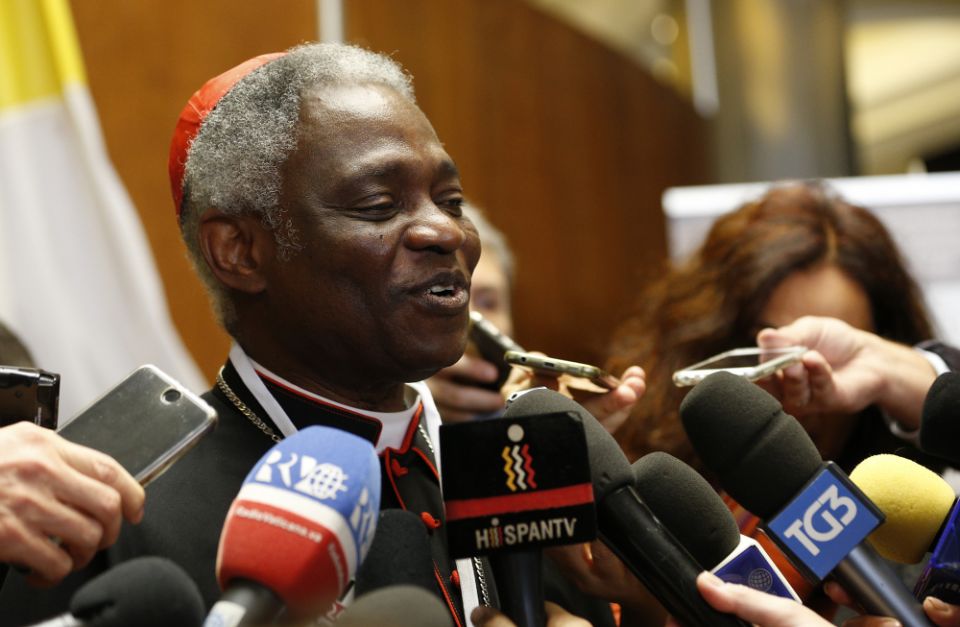Pope condemns possession of nuclear weapons in shift from church's acceptance of deterrence
Pope Francis has openly denounced the continuing possession of nuclear weapons by various world governments, in what appears to be a departure from the Roman Catholic Church's prior acceptance of the Cold War-era global system of nuclear deterrence and mutually assured destruction.
Nov 13, 2017

By Joshua J. McElwee
Pope Francis has openly denounced the continuing possession of nuclear weapons by various world governments, in what appears to be a departure from the Roman Catholic Church's prior acceptance of the Cold War-era global system of nuclear deterrence and mutually assured destruction.
In a talk Nov. 10 to participants in a high-profile Vatican conference on nuclear disarmament, the pope also seemed to indirectly criticize world leaders such as U.S. President Donald Trump, who has openly threatened nuclear war with North Korea over that country's continuing development of nuclear arms.
Francis told the conference participants — who include the U.N. High Representative for Disarmament Affairs, NATO's deputy secretary general, and 11 Nobel Peace Prize laureates — that humanity cannot fail "to be genuinely concerned by the catastrophic humanitarian and environmental effects of any employment of nuclear devices."
"If we also take into account the risk of an accidental detonation as a result of error of any kind, the threat of their use, as well as their very possession, is to be firmly condemned," he said.
"International relations cannot be held captive to military force, mutual intimidation, and the parading of stockpiles of arms," the pope continued. "Weapons of mass destruction, particularly nuclear weapons, create nothing but a false sense of security. They cannot constitute the basis for peaceful coexistence between members of the human family."
While previous popes have called for the abolition of nuclear weapons, they also granted conditional moral acceptance to the system of nuclear deterrence, which arose after World War II when the United States and the Soviet Union stockpiled nuclear weapons in order to discourage either country from launching an atomic attack.
Pope John Paul II, for example, said in a message to the U.N. in June 1982 that the system of deterrence could be judged "morally acceptable" as "a step on the way toward a progressive disarmament."
The Vatican conference, hosted Nov. 10-11 by the new Dicastery for Promoting Integral Human Development, is the first major international gathering on disarmament since 122 countries signed a new U.N. treaty in July that calls for the complete elimination of nuclear weapons.
The Vatican is one of three signatories that have already ratified the agreement. None of the nuclear powers and no NATO members have signed on to the measure.
The disarmament conference is taking place as Trump is on an 11-day visit to several Asian nations. In South Korea Nov. 8, Trump warned North Korean leader Kim Jong Un that his quest to acquire nuclear weapons is putting his regime "in grave danger" and threatened: "Do not try us."
Cardinal Peter Turkson, the head of the Vatican dicastery, said at the conference's opening Nov. 10 that the event was planned long before Trump's visit to Asia was announced. "It just happens to be a happy coincidence," Turkson joked, adding: "If we believe in divine providence, that was part of it."
Turkson said he and the participants at the event had gathered "for a very candid conversation about how to achieve a world free of nuclear weapons."
In an apparent nod to North Korea, he added: "This conversation is urgently needed, given the current tensions among nuclear weapons states and given the tensions between nuclear weapons states and states seeking to become nuclear weapons states."
Cardinal Pietro Parolin, the Vatican's Secretary of State, told the conference their considerations take place during a "decidedly disheartening state of affairs" across the world.
Parolin noted that 2017 marks the 50th anniversary of Pope Paul VI's encyclical Populorum progressio, which proposed that the world's governments set aside a portion of their military spending for a global fund to relieve the needs of impoverished peoples.
Paraphrasing the encyclical, he stated: "Is it not plain to everyone that such a fund would reduce a need for those other expenditures that are motivated by fear [or] stubborn pride? Countless millions are starving. We cannot approve a debilitating arms race."
'Ethic of nuclear deterrence not morally warranted'
One of the speakers at the Vatican conference said he hopes it refocuses world attention on the nuclear ban treaty.
"At a time of irresponsible nuclear brinksmanship over North Korea … the Holy See is engaged in a high-profile effort to change the debate and refocus attention on the disarmament momentum generated by the July nuclear ban treaty," said Gerard Powers, director of Catholic Peacebuilding Studies at the University of Notre Dame's Kroc Institute for International Peace Studies.
“The Holy See is sending a clear message that the moral imperative of nuclear disarmament is and, should be, at the centre of the Church’s international agenda for peace,” said Powers.
(This article first appeared on NCRonline.org, the Website of National Catholic Reporter, and is being used with permission)







Total Comments:0